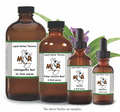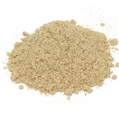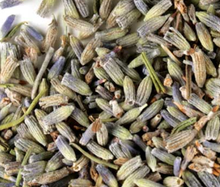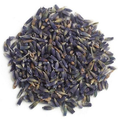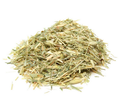 Loading... Please wait...
Loading... Please wait...- Home
- Bulk Herbs
- Herbs (J-L)
- Lavender Flower C/O
- Home
- Herbs - Certified Organic
- J-L
- Lavender Flower C/O
Product Description
Lavender Flowers
Certified Organic - France
Also Known As –Lavandula angustifolia
Overview - Lavender is a common garden plant in many areas of the world. Forming a mound of silver topped with spikes of flowers, this fragrant herb has been popular for centuries. It has made an impression from ancient Rome through the plague-ridden Middle Ages. Royalty has demanded its availability and the common people relied on it for many reasons.
Medicinal Uses – Internally, Lavender can be brewed into an herbal tea to relieve headache due to fatigue and exhaustion. Take care not to imbibe too much, however as a large amount will upset the stomach. Externally, Lavender essential oil is used in a footbath to relieve fatigue. In the bath, a few drops aids relaxation after a difficult day. It can be applied to relieve the pain of toothache, sprains, neuralgia and rheumatism. Smelling the oil can lift the spirits, revive a person who has fainted and help depression. It can be rubbed on the temples to relieve headache. Oil can help with burns, sores and ulcers. It is antiseptic.
Other Uses – The flowers are often used in baking and to make jellies, teas and other treats. It is used in many perfumes to add depth to the scent. It is germicidal, and has been used successfully in veterinary practice to kill lice and other pests. It is sometimes used in embalming.
Herbs to Combine/Supplement - To kill head lice, mix a few drops of lavender oil, rosemary oil and tea tree oil into a carrier oil like sweet almond. Apply liberally to the scalp. Shampoo the following morning, combing out nits and lice. Reapply as needed for up to a week to make sure all bugs have been killed.
Parts Used - Flowers – The fragrant flowers are the source of the medicinal herb. Essential oil is distilled from the blossoms and flower stalks
Precautions - Lavender essential oil should not be taken internally. It can cause severe nausea. Excessive use may cause drowsiness. There is some suggestion of estrogen-like effects from using the oil and tea tree oil topically in commercial preparations. A case study of three pre-pubescent boys that developed some mammary growth that was determined to have been caused by these oils reverted when they stopped using them. Some caution may be warranted. Ingesting large amounts of lavender oil can result in convulsions and death.
- It has no known interactions with other herbs or medications.
Suggestions - Lavender can be taken as an herbal tea or a tincture. For herbal tea, take 5 to 10 grams of the herb into the water. Steep for fifteen minutes. Up to three cups of lavender tea can be taken per day. For the tincture, 2 to 4 ml can be taken 2 to 3 times per day. The essential oil can be applied topically if the oil is diluted. A few drops can also be added to a bath.
Disclaimer - The information presented herein by Mountain Maus’ Remedies is intended for educational purposes only. These statements have not been evaluated by the FDA and are not intended to diagnose, cure, treat or prevent disease. Individual results may vary, and before using any supplements, it is always advisable to consult with your own health care provider.







